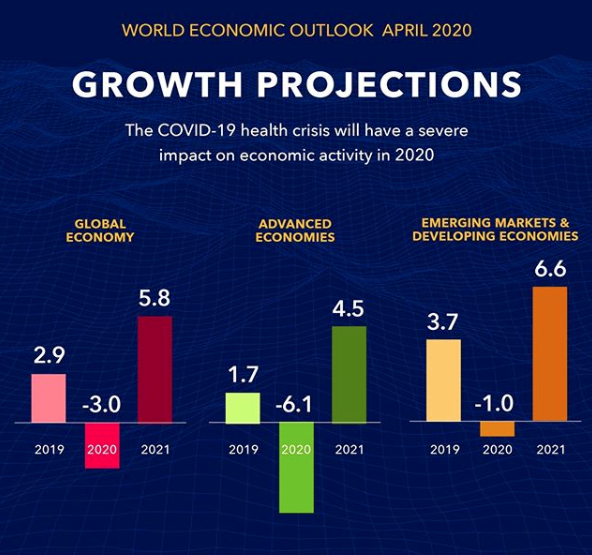IMF shares downward trajectory of global economy

International Monetary Fund projects global growth to fall -3% in 2020
International Monetary Fund Chief Economist Gita Gopinath spoke at a press briefing today to discuss the potential ramifications of COVID-19 on the global economy. The immense scale and magnitude of the virus has placed the world in what experts are referring to as the “Great Lockdown”.
The IMF’s latest World Economic Outlook (WEO) sees the global economy faltering and forecasts negative global growth of -3% in 2020 because of the COVID-19 pandemic. IMF Chief Economist Gita Gopinath said: “Under the assumption that the pandemic and required containment peaks in the second quarter in most countries of the world and then recedes in the second half of this year, we are projecting global growth in 2020 to fall to -3%. This is a downgrade of 6.3 percentage points from January 2020. A major revision over a very short period of time. This makes the Great Lockdown the worst recession since the Great Depression and far worse than the global financial crisis. “
With global efforts to control the pandemic, the IMF predicts only a partial recovery in 2021.
“Assuming the pandemic fades in the second half of 2020 and that policy actions taken around the world are effective in preventing widespread firm bankruptcies, extended job losses and system wide financial strength, we project global growth in 2021 to rebound to 5.8%. Now, this recovery in 2021 is only partial, as the level of economic activity is projected to remain below the level we had projected for 2021 before the virus hit,” shared Gopinath.
She also stressed that full economic recovery can only be established when the pandemic is under control and new therapies or vaccines are available to all.
“In a sense, there is no trade-off between saving lives and saving livelihoods. Countries should continue to generously support their health systems, perform widespread testing, and refrain from trade restrictions on medical supplies. A global effort must be sure that when therapies and vaccines are developed, both rich and poor nations alike have immediate access,” said Gopinath.
“As long as interest rates remain very low as we see and we get the recovery that we are projecting, then the combination should help in bringing down debt levels slowly over time. There will be some countries in the world that would require help, external aid, debt restructurings, but we'll have to see what that looks like once we come out of this pandemic.”
Gopinath does point out that there are some hopeful signs that the crisis will end soon as countries are imposing guidelines, testing and policies for those affected.










